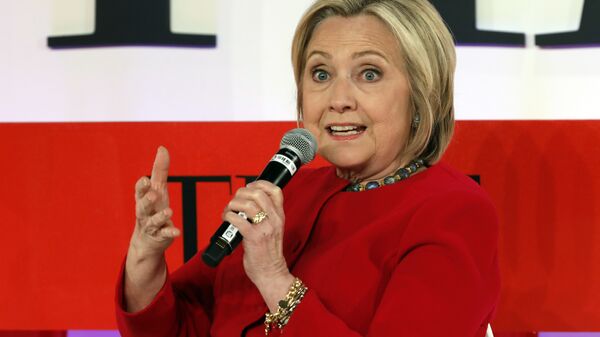The hashtag #ClintonBodyCount skyrocketed in popularity on Tuesday, rising to third spot in the US, shortly after Jeffrey Epstein, who faces 45 years behind bars if convicted, was alleged to have tried to commit suicide or even to have survived an assassination attempt.
The purported suicide attempt came in its turn hours after The Daily Beast published a story on Wednesday that looked into financial ties between politically connected socialite billionaire Epstein and Bill Clinton, who is among the politicians he regularly rubbed shoulders with. Shortly thereafter, netizens witnessed the comeback of a notorious hashtag - #ClintonBodyCount.
Coined by author and conspiracy theorist Danny Casolaro in the late 1980s, the now trending phrase “Clinton Body Count” has since been used by right-wingers to link the mysterious and at times bizarre deaths of people connected in one way or another to the Clinton couple. Many have allegedly committed suicide, while three Secret Service men fell out of a helicopter to their deaths, etc.
The most recent case was the unproven armed robbery of Democratic National Committee staffer Seth Rich in 2016, which turned fatal as the man died in hospital 1.5 hours after getting shot twice in the back.
Netizens couldn’t help chewing over the trending phrase, with many bringing up the mainstream rhetoric that “Russian bots” had flooded the Internet to have their say. Many suggested that it was to dilute the “knockout” effect of, for instance, former US Special Counsel Robert Mueller’s testimony in front of Congress, which turned out to be a dud.
Others cited another trending hashtag - #MuellerReportdisaster, in addition to the above, to underpin the claim.
Russian bots at it again. #ClintonBodyCount pic.twitter.com/jRpphASwBv
— Every 1 Luvs Red (@Candygrl38) July 25, 2019
Wow, the Russian bots are in FULL force with this #EpsteinSuicide #ClintonBodyCount bullshit
— Andrew King (@kingofmycountry) July 25, 2019
“at least the #ClintonBodyCount conspiracy theory is showing us which accounts are actually Russian bots” pic.twitter.com/heEGRw9BUD
— Paul Smeenis (@virtual_keat) July 25, 2019
I wonder if all the libs' warnings about Russian bots pushing #MuellerHearingDisaster and #ClintonBodyCount are actually just making it trend themselves by tweeting about it.
— Jake Rockatanksy (@RealRockatansky) July 25, 2019
A true #libparadox
Another thing that works, is go through Russian trending hashtags....this morning it was ClintonBodyCount.
— 🌊🐘 Colleen 🐘🌊 (@gopsaidwhat) July 25, 2019
I went through this morning & reported and blocked a boatload of Russian bots, trolls & MAGAts. 😉
Some noticed that such a distraction by means of a conspiracy theory is hardly needed – taking into account Mueller’s slippery and ambiguous answers, as he struggled to remember key details from his report and refused to answer anything beyond the scope of the document.
“Wow. Robert Mueller changing the job of a prosecutor from proving someone ‘Guilty beyond a reasonable doubt’ to ‘Not being able to exonerate someone accused of a crime’. Dangerous and ridiculous”, Senator Lindsey Graham tweeted. Meanwhile, Trump chose to repost a statement from his personal lawyer, Jay Sekulow:
“This morning’s testimony exposed the troubling deficiencies of the Special Counsel’s investigation. The testimony revealed that this probe was conducted by a small group of politically-biased prosecutors …” Sekulow’s tweet read, adding that it was also clear that the special counsel conducted his probe “unimpeded”.
#Mueller looks and sounds weak, frail and confused during congressional testimony. Awaiting “Who am I? Why am I here?” from him any moment. Very apparent Mueller didn’t lead investigation. Unscrupulous and dishonest Andrew Weissman did. #MuellerHearing #MAGA #Trump2020 pic.twitter.com/yOeklu9Avw
— Cigar Dave (@CigarDaveShow) July 24, 2019
Many, however, argued that the accusations against “Russian bots” promoting the anti-Clinton hashtag are utterly stupid and far-fetched, but also made room for hilarious remarks:
We are all Russian bots bro. Lol #ClintonBodyCount
— randometheus (@LongfellowMason) July 25, 2019
If Russian Bots are the reason #ClintonBodyCount is Trending. Who’s to blame everytime Trump is trending? Some kids with Mustard and Ketchup stains on their dirty T-Shirt with a dirty Bandana on their face 😂😂😂😂😂😂💯
— StreetBeatz ENT (@StreetbeatzE) July 25, 2019
I wonder if all the libs' warnings about Russian bots pushing #MuellerHearingDisaster and #ClintonBodyCount are actually just making it trend themselves by tweeting about it.
— Jake Rockatanksy (@RealRockatansky) July 25, 2019
A true #libparadox
Others struck back in seriousness:
hey, democrats and socialists...listen... #ClintonBodyCount and #MuellerHearingDisaster are trending because we patriotic Americans love our country and value decency, and we punish actual criminals. you can call us russian bots all you want. we're real, and we are the majority.
— jonas the hillbilly🇺🇸 (@spacebabyjonas) July 25, 2019
b-but it’s muh russian bots no way the .. the clintons could .. #ClintonBodyCount
— シンダー (@hatefemoids) July 25, 2019




